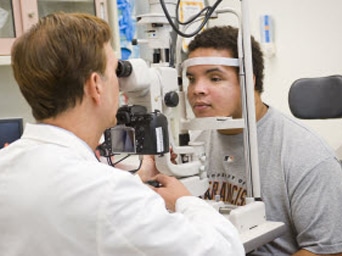Some Vets with Traumatic Brain Injury Have Hidden Eye Injuries
A recent study conducted by the Department of Veterans Affairs (VA) reveals the extent of internal eye injuries (closed-eye ocular injuries) among Veterans who have sustained blast-induced traumatic brain injury (TBI). Exposure to such blasts is not uncommon in current combat and may result in open injuries to the eyes, which are diagnosed and cared for on scene; however, internal eye injuries are less apparent and may not be detected without more comprehensive examination.
This study, which was conducted from 2006-2009 and is featured in the latest issue of New England Journal of Medicine, evaluated 46 combat Veterans with documented TBI who were injured in Iraq or Afghanistan. Dr. Glenn Cockerham, one of the lead authors, explains what led to conducting this study. “We started seeing internal eye injuries in a significant percentage of Veterans with TBI due to combat-blast exposure. In some instances, injuries were not expected by patients.” Twenty of these Veterans, or 43 percent, were found to have internal eye injuries, with no association to TBI severity levels. Immediate or delayed loss of vision is possible in any of these cases; three Veterans required medical or surgical intervention after examinations.
These injuries were realized only through comprehensive ocular examinations by VA ophthalmologists, prompting VA to implement a 2008 directive mandating such thorough examinations for all inpatients with TBI in rehabilitation centers. However, many Veterans that were diagnosed with TBI or exposed to blast forces in the past and have returned to civilian life have not received such examinations and may have undetected internal eye injuries.
Most of these injuries – and their related symptoms – go undetected in standard eye exams. In fact, among Veterans that participated in the study, vision was 20/20 or better in most of the injured eyes. “The study by Dr. Cockerham and associates clearly shows the importance of comprehensive eye examinations for patients with blast-induced TBI,” stated Dr. Mary Lawrence, Deputy Executive Director, Department of Defense/Veterans Affairs Vision Center of Excellence (VCE).
VA is advising physicians of current or former military personnel to inquire about blast exposure, and is encouraging any Veteran who may have been exposed to a blast, even those with normal visual acuity, to be evaluated by an eye care provider. The study’s findings need to be validated in a larger, more representative sample, but underscore the need for immediate ocular screenings for those Veterans who may have been affected.
ATTENTION READERS
We See The World From All Sides and Want YOU To Be Fully InformedIn fact, intentional disinformation is a disgraceful scourge in media today. So to assuage any possible errant incorrect information posted herein, we strongly encourage you to seek corroboration from other non-VT sources before forming an educated opinion.
About VT - Policies & Disclosures - Comment Policy




